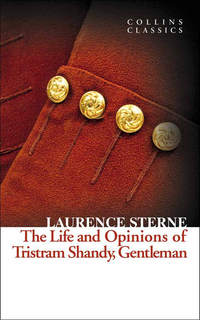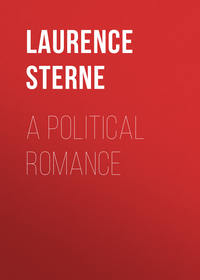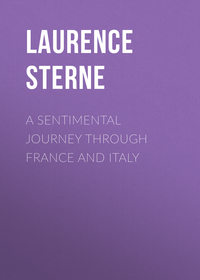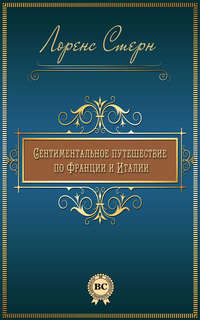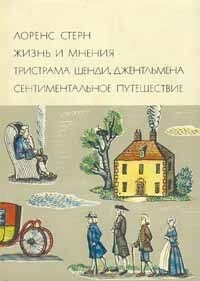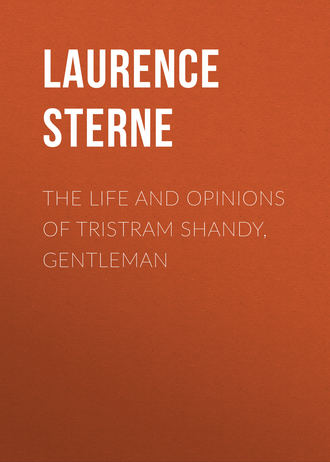
The Life and Opinions of Tristram Shandy, Gentleman
–A slut! in running them over within these five minutes that I have stood looking at her, she has let fall at least a dozen loops in a white thread stocking—yes, yes—I see, you cunning gipsy!—'tis long and taper—you need not pin it to your knee—and that 'tis your own—and fits you exactly.—
–That Nature should have told this creature a word about a statue's thumb!
–But as this sample is worth all their thumbs—besides, I have her thumbs and fingers in at the bargain, if they can be any guide to me,—and as Janatone withal (for that is her name) stands so well for a drawing—may I never draw more, or rather may I draw like a draught-horse, by main strength all the days of my life,—if I do not draw her in all her proportions, and with as determined a pencil, as if I had her in the wettest drapery.—
–But your worships chuse rather that I give you the length, breadth, and perpendicular height of the great parish-church, or drawing of the facade of the abbey of Saint Austreberte which has been transported from Artois hither—every thing is just I suppose as the masons and carpenters left them,—and if the belief in Christ continues so long, will be so these fifty years to come—so your worships and reverences may all measure them at your leisures—but he who measures thee, Janatone, must do it now—thou carriest the principles of change within thy frame; and considering the chances of a transitory life, I would not answer for thee a moment; ere twice twelve months are passed and gone, thou mayest grow out like a pumpkin, and lose thy shapes—or thou mayest go off like a flower, and lose thy beauty—nay, thou mayest go off like a hussy—and lose thyself.—I would not answer for my aunt Dinah, was she alive—'faith, scarce for her picture—were it but painted by Reynolds—
But if I go on with my drawing, after naming that son of Apollo, I'll be shot—
So you must e'en be content with the original; which, if the evening is fine in passing thro' Montreuil, you will see at your chaise-door, as you change horses: but unless you have as bad a reason for haste as I have—you had better stop:—She has a little of the devote: but that, sir, is a terce to a nine in your favour— -L… help me! I could not count a single point: so had been piqued and repiqued, and capotted to the devil.
Chapter 3.XCIII
All which being considered, and that Death moreover might be much nearer me than I imagined—I wish I was at Abbeville, quoth I, were it only to see how they card and spin—so off we set.
(Vid. Book of French post-roads, page 36. edition of 1762.)
de Montreuil a Nampont- poste et demi
de Nampont a Bernay – poste
de Bernay a Nouvion – poste
de Nouvion a Abbeville poste
–but the carders and spinners were all gone to bed.
Chapter 3.XCIV
What a vast advantage is travelling! only it heats one; but there is a remedy for that, which you may pick out of the next chapter.
Chapter 3.XCV
Was I in a condition to stipulate with Death, as I am this moment with my apothecary, how and where I will take his clyster—I should certainly declare against submitting to it before my friends; and therefore I never seriously think upon the mode and manner of this great catastrophe, which generally takes up and torments my thoughts as much as the catastrophe itself; but I constantly draw the curtain across it with this wish, that the Disposer of all things may so order it, that it happen not to me in my own house—but rather in some decent inn—at home, I know it,—the concern of my friends, and the last services of wiping my brows, and smoothing my pillow, which the quivering hand of pale affection shall pay me, will so crucify my soul, that I shall die of a distemper which my physician is not aware of: but in an inn, the few cold offices I wanted, would be purchased with a few guineas, and paid me with an undisturbed, but punctual attention—but mark. This inn should not be the inn at Abbeville—if there was not another inn in the universe, I would strike that inn out of the capitulation: so
Let the horses be in the chaise exactly by four in the morning—Yes, by four, Sir,—or by Genevieve! I'll raise a clatter in the house shall wake the dead.
Chapter 3.XCVI
'Make them like unto a wheel,' is a bitter sarcasm, as all the learned know, against the grand tour, and that restless spirit for making it, which David prophetically foresaw would haunt the children of men in the latter days; and therefore, as thinketh the great bishop Hall, 'tis one of the severest imprecations which David ever utter'd against the enemies of the Lord—and, as if he had said, 'I wish them no worse luck than always to be rolling about.'—So much motion, continues he (for he was very corpulent)—is so much unquietness; and so much of rest, by the same analogy, is so much of heaven.
Now, I (being very thin) think differently; and that so much of motion, is so much of life, and so much of joy—and that to stand still, or get on but slowly, is death and the devil—
Hollo! Ho!—the whole world's asleep!—bring out the horses—grease the wheels—tie on the mail—and drive a nail into that moulding—I'll not lose a moment—
Now the wheel we are talking of, and whereinto (but not whereonto, for that would make an Ixion's wheel of it) he curseth his enemies, according to the bishop's habit of body, should certainly be a post-chaise wheel, whether they were set up in Palestine at that time or not—and my wheel, for the contrary reasons, must as certainly be a cart-wheel groaning round its revolution once in an age; and of which sort, were I to turn commentator, I should make no scruple to affirm, they had great store in that hilly country.
I love the Pythagoreans (much more than ever I dare tell my dear Jenny) for their '(Greek)'—(their) 'getting out of the body, in order to think well.' No man thinks right, whilst he is in it; blinded as he must be, with his congenial humours, and drawn differently aside, as the bishop and myself have been, with too lax or too tense a fibre—Reason is, half of it, Sense; and the measure of heaven itself is but the measure of our present appetites and concoctions.—
–But which of the two, in the present case, do you think to be mostly in the wrong?
You, certainly: quoth she, to disturb a whole family so early.
Chapter 3.XCVII
—But she did not know I was under a vow not to shave my beard till I got to Paris;—yet I hate to make mysteries of nothing;—'tis the cold cautiousness of one of those little souls from which Lessius (lib. 13. de moribus divinis, cap. 24.) hath made his estimate, wherein he setteth forth, That one Dutch mile, cubically multiplied, will allow room enough, and to spare, for eight hundred thousand millions, which he supposes to be as great a number of souls (counting from the fall of Adam) as can possibly be damn'd to the end of the world.
From what he has made this second estimate—unless from the parental goodness of God—I don't know—I am much more at a loss what could be in Franciscus Ribbera's head, who pretends that no less a space than one of two hundred Italian miles multiplied into itself, will be sufficient to hold the like number—he certainly must have gone upon some of the old Roman souls, of which he had read, without reflecting how much, by a gradual and most tabid decline, in the course of eighteen hundred years, they must unavoidably have shrunk so as to have come, when he wrote, almost to nothing.
In Lessius's time, who seems the cooler man, they were as little as can be imagined—
–We find them less now—
And next winter we shall find them less again; so that if we go on from little to less, and from less to nothing, I hesitate not one moment to affirm, that in half a century at this rate, we shall have no souls at all; which being the period beyond which I doubt likewise of the existence of the Christian faith, 'twill be one advantage that both of 'em will be exactly worn out together.
Blessed Jupiter! and blessed every other heathen god and goddess! for now ye will all come into play again, and with Priapus at your tails—what jovial times!—but where am I? and into what a delicious riot of things am I rushing? I—I who must be cut short in the midst of my days, and taste no more of 'em than what I borrow from my imagination—peace to thee, generous fool! and let me go on.
Chapter 3.XCVIII
—'So hating, I say, to make mysteries of nothing'—I intrusted it with the post-boy, as soon as ever I got off the stones; he gave a crack with his whip to balance the compliment; and with the thill-horse trotting, and a sort of an up and a down of the other, we danced it along to Ailly au clochers, famed in days of yore for the finest chimes in the world; but we danced through it without music—the chimes being greatly out of order—(as in truth they were through all France).
And so making all possible speed, from
Ailly au clochers, I got to Hixcourt, from Hixcourt I got to Pequignay, and from Pequignay, I got to Amiens, concerning which town I have nothing to inform you, but what I have informed you once before—and that was—that Janatone went there to school.
Chapter 3.XCIX
In the whole catalogue of those whiffling vexations which come puffing across a man's canvass, there is not one of a more teasing and tormenting nature, than this particular one which I am going to describe—and for which (unless you travel with an avance-courier, which numbers do in order to prevent it)—there is no help: and it is this.
That be you in never so kindly a propensity to sleep—though you are passing perhaps through the finest country—upon the best roads, and in the easiest carriage for doing it in the world—nay, was you sure you could sleep fifty miles straight forwards, without once opening your eyes—nay, what is more, was you as demonstratively satisfied as you can be of any truth in Euclid, that you should upon all accounts be full as well asleep as awake—nay, perhaps better—Yet the incessant returns of paying for the horses at every stage,—with the necessity thereupon of putting your hand into your pocket, and counting out from thence three livres fifteen sous (sous by sous), puts an end to so much of the project, that you cannot execute above six miles of it (or supposing it is a post and a half, that is but nine)—were it to save your soul from destruction.
–I'll be even with 'em, quoth I, for I'll put the precise sum into a piece of paper, and hold it ready in my hand all the way: 'Now I shall have nothing to do,' said I (composing myself to rest), 'but to drop this gently into the post-boy's hat, and not say a word.'—Then there wants two sous more to drink—or there is a twelve sous piece of Louis XIV. which will not pass—or a livre and some odd liards to be brought over from the last stage, which Monsieur had forgot; which altercations (as a man cannot dispute very well asleep) rouse him: still is sweet sleep retrievable; and still might the flesh weigh down the spirit, and recover itself of these blows—but then, by heaven! you have paid but for a single post—whereas 'tis a post and a half; and this obliges you to pull out your book of post-roads, the print of which is so very small, it forces you to open your eyes, whether you will or no: Then Monsieur le Cure offers you a pinch of snuff—or a poor soldier shews you his leg—or a shaveling his box—or the priestesse of the cistern will water your wheels—they do not want it—but she swears by her priesthood (throwing it back) that they do:—then you have all these points to argue, or consider over in your mind; in doing of which, the rational powers get so thoroughly awakened—you may get 'em to sleep again as you can.
It was entirely owing to one of these misfortunes, or I had pass'd clean by the stables of Chantilly—
–But the postillion first affirming, and then persisting in it to my face, that there was no mark upon the two sous piece, I open'd my eyes to be convinced—and seeing the mark upon it as plain as my nose—I leap'd out of the chaise in a passion, and so saw every thing at Chantilly in spite.—I tried it but for three posts and a half, but believe 'tis the best principle in the world to travel speedily upon; for as few objects look very inviting in that mood—you have little or nothing to stop you; by which means it was that I passed through St. Dennis, without turning my head so much as on one side towards the Abby—
–Richness of their treasury! stuff and nonsense!—bating their jewels, which are all false, I would not give three sous for any one thing in it, but Jaidas's lantern—nor for that either, only as it grows dark, it might be of use.
Chapter 3.C
Crack, crack—crack, crack—crack, crack—so this is Paris! quoth I (continuing in the same mood)—and this is Paris!—humph!—Paris! cried I, repeating the name the third time—
The first, the finest, the most brilliant—
The streets however are nasty.
But it looks, I suppose, better than it smells—crack, crack—crack, crack—what a fuss thou makest!—as if it concerned the good people to be informed, that a man with pale face and clad in black, had the honour to be driven into Paris at nine o'clock at night, by a postillion in a tawny yellow jerkin, turned up with red calamanco—crack, crack—crack, crack—crack, crack,—I wish thy whip—
–But 'tis the spirit of thy nation; so crack—crack on.
Ha!—and no one gives the wall!—but in the School of Urbanity herself, if the walls are besh..t—how can you do otherwise?
And prithee when do they light the lamps? What?—never in the summer months!—Ho! 'tis the time of sallads.—O rare! sallad and soup—soup and sallad—sallad and soup, encore—
–'Tis too much for sinners.
Now I cannot bear the barbarity of it; how can that unconscionable coachman talk so much bawdy to that lean horse? don't you see, friend, the streets are so villanously narrow, that there is not room in all Paris to turn a wheelbarrow? In the grandest city of the whole world, it would not have been amiss, if they had been left a thought wider; nay, were it only so much in every single street, as that a man might know (was it only for satisfaction) on which side of it he was walking.
One—two—three—four—five—six—seven—eight—nine—ten.—Ten cooks shops! and twice the number of barbers! and all within three minutes driving! one would think that all the cooks in the world, on some great merry-meeting with the barbers, by joint consent had said—Come, let us all go live at Paris: the French love good eating—they are all gourmands—we shall rank high; if their god is their belly—their cooks must be gentlemen: and forasmuch as the periwig maketh the man, and the periwig-maker maketh the periwig—ergo, would the barbers say, we shall rank higher still—we shall be above you all—we shall be Capitouls (Chief Magistrate in Toulouse, &c. &c. &c.) at least—pardi! we shall all wear swords—
–And so, one would swear, (that is, by candle-light,—but there is no depending upon it,) they continued to do, to this day.
Chapter 3.CI
The French are certainly misunderstood:—but whether the fault is theirs, in not sufficiently explaining themselves; or speaking with that exact limitation and precision which one would expect on a point of such importance, and which, moreover, is so likely to be contested by us—or whether the fault may not be altogether on our side, in not understanding their language always so critically as to know 'what they would be at'—I shall not decide; but 'tis evident to me, when they affirm, 'That they who have seen Paris, have seen every thing,' they must mean to speak of those who have seen it by day-light.
As for candle-light—I give it up—I have said before, there was no depending upon it—and I repeat it again; but not because the lights and shades are too sharp—or the tints confounded—or that there is neither beauty or keeping, &c....for that's not truth—but it is an uncertain light in this respect, That in all the five hundred grand Hotels, which they number up to you in Paris—and the five hundred good things, at a modest computation (for 'tis only allowing one good thing to a Hotel), which by candle-light are best to be seen, felt, heard, and understood (which, by the bye, is a quotation from Lilly)—the devil a one of us out of fifty, can get our heads fairly thrust in amongst them.
This is no part of the French computation: 'tis simply this,
That by the last survey taken in the year one thousand seven hundred and sixteen, since which time there have been considerable augmentations, Paris doth contain nine hundred streets; (viz)
In the quarter called the City—there are fifty-three streets.
In St. James of the Shambles, fifty-five streets.
In St. Oportune, thirty-four streets.
In the quarter of the Louvre, twenty-five streets.
In the Palace Royal, or St. Honorius, forty-nine streets.
In Mont. Martyr, forty-one streets.
In St. Eustace, twenty-nine streets.
In the Halles, twenty-seven streets.
In St. Dennis, fifty-five streets.
In St. Martin, fifty-four streets.
In St. Paul, or the Mortellerie, twenty-seven streets.
The Greve, thirty-eight streets.
In St. Avoy, or the Verrerie, nineteen streets.
In the Marais, or the Temple, fifty-two streets.
In St. Antony's, sixty-eight streets.
In the Place Maubert, eighty-one streets.
In St. Bennet, sixty streets.
In St. Andrews de Arcs, fifty-one streets.
In the quarter of the Luxembourg, sixty-two streets.
And in that of St. Germain, fifty-five streets, into any of which you may walk; and that when you have seen them with all that belongs to them, fairly by day-light—their gates, their bridges, their squares, their statues…and have crusaded it moreover, through all their parish-churches, by no means omitting St. Roche and Sulpice…and to crown all, have taken a walk to the four palaces, which you may see, either with or without the statues and pictures, just as you chuse—
–Then you will have seen—
–but 'tis what no one needeth to tell you, for you will read of it yourself upon the portico of the Louvre, in these words,
Earth No Such Folks!—No Folks E'er Such A TownAs Paris Is!—Sing, Derry, Derry, Down.(Non orbis gentem, non urbem gens habet ullam—ulla parem.)The French have a gay way of treating every thing that is Great; and that is all can be said upon it.
Chapter 3.CII
In mentioning the word gay (as in the close of the last chapter) it puts one (i.e. an author) in mind of the word spleen—especially if he has any thing to say upon it: not that by any analysis—or that from any table of interest or genealogy, there appears much more ground of alliance betwixt them, than betwixt light and darkness, or any two of the most unfriendly opposites in nature—only 'tis an undercraft of authors to keep up a good understanding amongst words, as politicians do amongst men—not knowing how near they may be under a necessity of placing them to each other—which point being now gain'd, and that I may place mine exactly to my mind, I write it down here—
Spleen.
This, upon leaving Chantilly, I declared to be the best principle in the world to travel speedily upon; but I gave it only as matter of opinion. I still continue in the same sentiments—only I had not then experience enough of its working to add this, that though you do get on at a tearing rate, yet you get on but uneasily to yourself at the same time; for which reason I here quit it entirely, and for ever, and 'tis heartily at any one's service—it has spoiled me the digestion of a good supper, and brought on a bilious diarrhoea, which has brought me back again to my first principle on which I set out—and with which I shall now scamper it away to the banks of the Garonne—
–No;—I cannot stop a moment to give you the character of the people—their genius—their manners—their customs—their laws—their religion—their government—their manufactures—their commerce—their finances, with all the resources and hidden springs which sustain them: qualified as I may be, by spending three days and two nights amongst them, and during all that time making these things the entire subject of my enquiries and reflections—
Still—still I must away—the roads are paved—the posts are short—the days are long—'tis no more than noon—I shall be at Fontainebleau before the king—
–Was he going there? not that I know—
End of the Third Volume.
THE LIFE AND OPINIONS OF TRISTRAM SHANDY, GENT.—VOLUME THE FOURTH
Non enim excursus hic ejus, sed opus ipsum est.
Plin. Lib. V. Epist. 6.
Si quid urbaniuscule lusum a nobis, per Musas et Charitas et omnium poetarum Numina, Oro te, ne me male capias.
A Dedication to a Great Man.
Having, a priori, intended to dedicate The Amours of my Uncle Toby to Mr. …—I see more reasons, a posteriori, for doing it to Lord........
I should lament from my soul, if this exposed me to the jealousy of their Reverences; because a posteriori, in Court-latin, signifies the kissing hands for preferment—or any thing else—in order to get it.
My opinion of Lord....... is neither better nor worse, than it was of Mr. .... Honours, like impressions upon coin, may give an ideal and local value to a bit of base metal; but Gold and Silver will pass all the world over without any other recommendation than their own weight.
The same good-will that made me think of offering up half an hour's amusement to Mr.... when out of place—operates more forcibly at present, as half an hour's amusement will be more serviceable and refreshing after labour and sorrow, than after a philosophical repast.
Nothing is so perfectly amusement as a total change of ideas; no ideas are so totally different as those of Ministers, and innocent Lovers: for which reason, when I come to talk of Statesmen and Patriots, and set such marks upon them as will prevent confusion and mistakes concerning them for the future—I propose to dedicate that Volume to some gentle Shepherd,
Whose thoughts proud Science never taught to stray,Far as the Statesman's walk or Patriot-way;Yet simple Nature to his hopes had givenOut of a cloud-capp'd head a humbler heaven;Some untam'd World in depths of wood embraced—Some happier Island in the wat'ry-waste—And where admitted to that equal sky,His faithful Dogs should bear him company.In a word, by thus introducing an entire new set of objects to his Imagination, I shall unavoidably give a Diversion to his passionate and love-sick Contemplations. In the mean time,
I am
The Author.
Chapter 4.I
Now I hate to hear a person, especially if he be a traveller, complain that we do not get on so fast in France as we do in England; whereas we get on much faster, consideratis considerandis; thereby always meaning, that if you weigh their vehicles with the mountains of baggage which you lay both before and behind upon them—and then consider their puny horses, with the very little they give them—'tis a wonder they get on at all: their suffering is most unchristian, and 'tis evident thereupon to me, that a French post-horse would not know what in the world to do, was it not for the two words...... and...... in which there is as much sustenance, as if you give him a peck of corn: now as these words cost nothing, I long from my soul to tell the reader what they are; but here is the question—they must be told him plainly, and with the most distinct articulation, or it will answer no end—and yet to do it in that plain way—though their reverences may laugh at it in the bed-chamber—full well I wot, they will abuse it in the parlour: for which cause, I have been volving and revolving in my fancy some time, but to no purpose, by what clean device or facette contrivance I might so modulate them, that whilst I satisfy that ear which the reader chuses to lend me—I might not dissatisfy the other which he keeps to himself.
–My ink burns my finger to try—and when I have—'twill have a worse consequence—It will burn (I fear) my paper.
–No;—I dare not—
But if you wish to know how the abbess of Andouillets and a novice of her convent got over the difficulty (only first wishing myself all imaginable success)—I'll tell you without the least scruple.
Chapter 4.II
The abbess of Andouillets, which if you look into the large set of provincial maps now publishing at Paris, you will find situated amongst the hills which divide Burgundy from Savoy, being in danger of an Anchylosis or stiff joint (the sinovia of her knee becoming hard by long matins), and having tried every remedy—first, prayers and thanksgiving; then invocations to all the saints in heaven promiscuously—then particularly to every saint who had ever had a stiff leg before her—then touching it with all the reliques of the convent, principally with the thigh-bone of the man of Lystra, who had been impotent from his youth—then wrapping it up in her veil when she went to bed—then cross-wise her rosary—then bringing in to her aid the secular arm, and anointing it with oils and hot fat of animals—then treating it with emollient and resolving fomentations—then with poultices of marsh-mallows, mallows, bonus Henricus, white lillies and fenugreek—then taking the woods, I mean the smoak of 'em, holding her scapulary across her lap—then decoctions of wild chicory, water-cresses, chervil, sweet cecily and cochlearia—and nothing all this while answering, was prevailed on at last to try the hot-baths of Bourbon—so having first obtained leave of the visitor-general to take care of her existence—she ordered all to be got ready for her journey: a novice of the convent of about seventeen, who had been troubled with a whitloe in her middle finger, by sticking it constantly into the abbess's cast poultices, &c.—had gained such an interest, that overlooking a sciatical old nun, who might have been set up for ever by the hot-baths of Bourbon, Margarita, the little novice, was elected as the companion of the journey.


